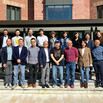Jamie Horsley and Robert Williams Hold Workshop with China’s Supreme People’s Court on Administrative Guiding Cases
Judicial reform continues to be an important element of China’s broader legal reform process, and China’s Supreme People’s Court (SPC) is taking steps under the new leadership of SPC President Zhou Qiang to strengthen the independence and professionalism of the judiciary in China’s political system. Capitalizing on the new atmosphere for judicial reform, The China Law Center co-sponsored a workshop on March 22 in Hangzhou with the SPC Administrative Tribunal and Professor Zheng Chunyan of Zhejiang University’s Guanghua Law School to bring together U.S. and Chinese judges and legal scholars to promote improvement and effective implementation of the SPC’s “guiding” cases system, focusing on administrative cases involving citizen-state disputes. Case law has not been viewed as a source of law in China’s civil law system, although the SPC has for some time been selecting “model” cases and in 2010 introduced an innovative “guiding” cases system to help foster greater uniformity and fairness in court decisions across the country.
The goal of this workshop was to concretely advance the work of SPC judges who are grappling with judicial review of administrative disputes, which pit Chinese citizens claiming injury against government actors. Issues addressed at this event included reviewing the criteria for selecting guiding administrative cases, thinking about how these cases should be used by judges at different levels, and recognizing the importance of having clear and well-reasoned decisions to promote consistency among different courts and to educate the public about the applicable law and legal principles. The Center’s Executive Director Jamie Horsley and Senior Fellow Robert Williams were joined for this event by three distinguished U.S. experts: Judge Richard Taranto of the U.S. Court of Appeals for the Federal Circuit, who spent most of his career as an appellate lawyer; Professor Randy Kozel of Notre Dame Law School, whose research focuses specifically on concepts of precedent and stare decisis; and Professor Jeffrey Lubbers of American University Washington College of Law, an administrative law expert with much experience in China.
The discussion covered a broad range of themes involving the role of courts and case law in China, including concepts of binding precedent, the craft of explicit judicial reasoning and the importance of publishing court judgments. After an introductory session covering the role of precedent in the U.S. federal system and questions regarding the status of guiding cases in China’s judicial system, those general principles of judicial reasoning were explored through a lively discussion of selected guiding administrative cases, with the Chinese judges who decided those cases presenting their analysis and U.S. experts then sharing how they analyzed the underlying issues and how a U.S. judge might have reasoned through them. All three experts responded helpfully to practical questions raised by the Chinese presenters and the audience comprised of judges (including SPC and lower-court representatives), scholars and legislators. Some Chinese scholars offered candid criticism of, and vigorously debated with judges and other participants, the utility and future direction of guiding cases. The workshop and major debates were reported by a variety of Chinese media. Zhejiang University sponsors envision this workshop, which was part of an ongoing cooperation with the SPC Administrative Tribunal, as setting the stage for continued exchanges on the development of guiding cases and judicial professionalism and effectiveness more generally.
Given the small number of guiding cases identified by the SPC to date and continued uncertainty as to their precedential status, the Center held a half-day roundtable on March 24 at Tsinghua University Law School in Beijing led by Professor He Haibo, on the topic of non-binding but persuasive judicial authority. Professor Kozel gave introductory remarks on the distinction between binding and non-binding authority in the U.S. judicial system, and Judge Taranto provided an overview of the issues that would be implicated in his judgment about how to treat a non-binding decision on point for a case under consideration—including the concept of “published vs. non-published reasoning.” Participating legal scholars and officials, who included one representative each from the SPC andthe National People’s Congress, engaged in animated exchange of views. Among the issues raised were whether guiding cases can or should be cited by lower courts, as compared to SPC judicial interpretations, the need for a comprehensive indexing system, and how case law fits into the broader judicial reform efforts currently underway in China.


